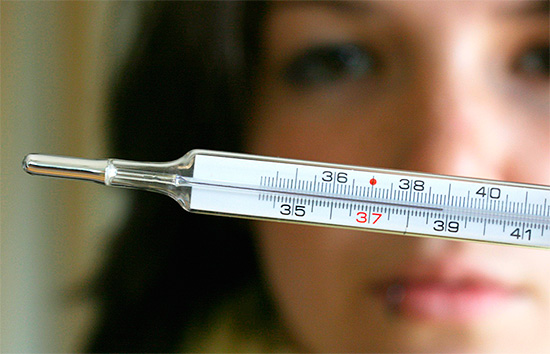
No matter how hard the dental surgeon tries to carefully remove your tooth, however, forcibly removing it from the hole is always associated with trauma to the surrounding tissues and the formation of a bleeding wound in the oral cavity. In response to the injury, the body of a healthy person almost always responds with an appropriate inflammatory process with characteristic signs, which include pain, redness, swelling and fever. That is why the temperature after tooth extraction is generally considered to be a normal phenomenon, but only so far it meets certain criteria, which we will discuss a little later.
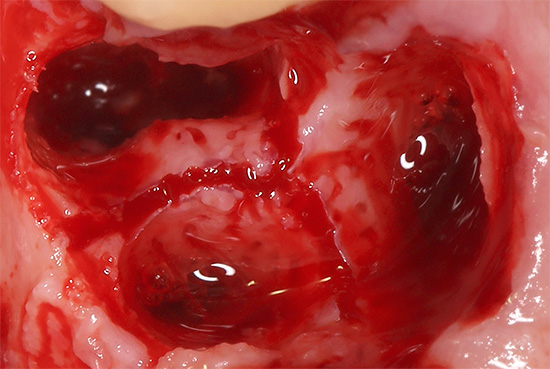
On a note
Studies have shown that there is some correlation between the rise in temperature immediately after tooth extraction and the patient’s emotional state during the procedure. A strong fear of surgery and emotional shock create additional prerequisites for an increase in temperature for some time after tooth extraction.
The temperature may rise after the extraction of any tooth: incisor, canine, wisdom tooth, etc. However, one should not immediately panic, since it is not so much the fact of a rise in temperature that is important as its dynamics over time and the accompanying symptoms (and, of course, the significance itself).
It should be understood that an increase in temperature is only an indicator of certain disorders in the body, the tip of the iceberg, reflecting the intense functioning of the immune system.
Why does a temperature rise after tooth extraction
A dentist-surgeon resorts to removing a diseased tooth only when it is no longer possible to save it for any reason. And the very first in the list of indications for tooth extraction is a disease under the general name "exacerbation of chronic periodontitis", although sometimes you can try to save the tooth even in such a difficult case.
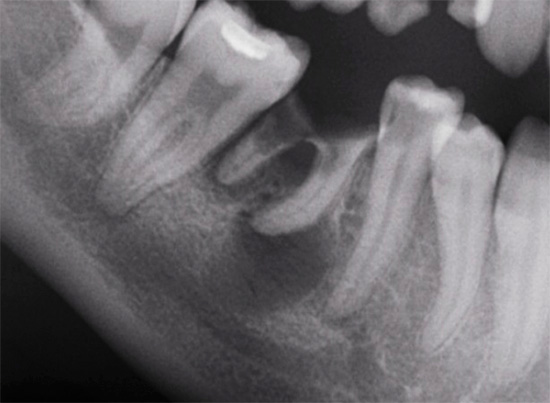
Against the background of exacerbation of periodontitis, the situation with the tooth is really depressing:
- in the carious cavity there are softened and pigmented carious tissues;
- inside the root canals, an inflamed pulp (“nerve”) breaks up (actually rots);
- around the tops of the roots of the tooth there is varying degrees of pronounced rarefaction of bone tissue - in the picture it reads as dark spots, lines, teeth, etc.
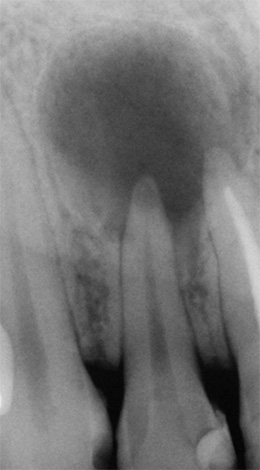
In such a situation, there is a high risk of leaving the infectious process in the hole even after all roots with cysts are extracted from it.
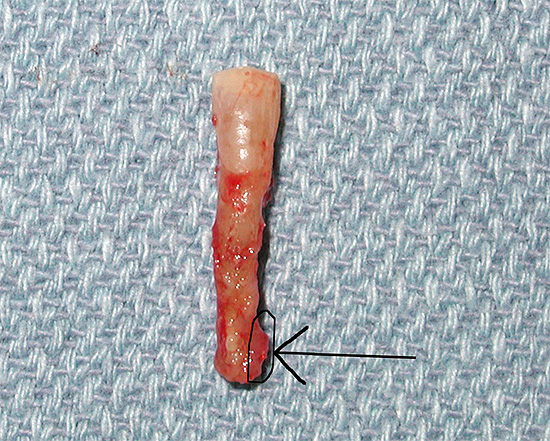
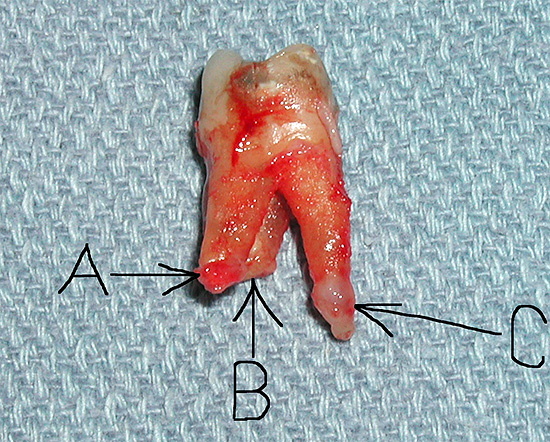
In practice, even taking into account the washing of the wound with an effective antiseptic solution, it is not possible to completely exclude the bacterial flora after tooth extraction, therefore, the patient subsequently experiences a natural increase in temperature, as a result of the immunity fighting the infection in the wound. Typically, in such cases, the temperature does not rise above 37.5 degrees, indicating the calm healing of damaged tissues.
The more damage the dentist-surgeon caused to the surrounding tissues when the tooth was removed, the higher the risk of a temperature increase to high values. Most often this happens on the first day of removal, closer to evening or at night: the temperature against the background of pain, swelling of the gums and cheeks can increase after tooth extraction to 38-39 degrees.
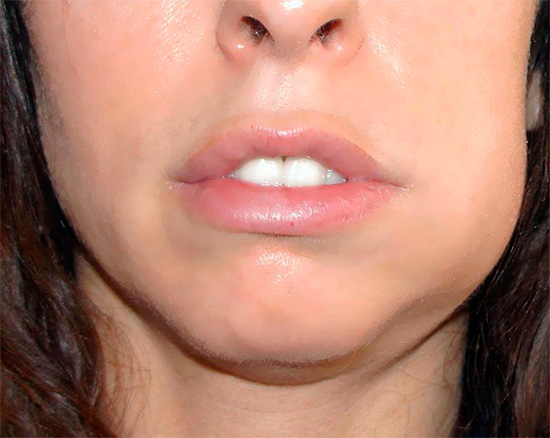
However, do not be scared and think that something incredible is happening. Often in the morning the temperature, pain and swelling pass by themselves. In the evening (that is, already a day after the tooth is removed), the temperature often rises again, but, as a rule, it is already no higher than 38 degrees.
Feedback:
“I went to a local clinic in my city, I had to pull out the lower wisdom tooth, which had been very sick for a long time, sometimes even unbearable. He arrived early in the morning, and after about 20 minutes he was already sitting in a chair with his mouth open and waiting for a sentence. The surgeon confirmed my suggestion that the tooth should be removed.It’s been a long time for me, I’ll tell you, they didn’t tear a tooth like that, they tortured us for about an hour, they turned everything there.
In the evening I felt sick, my head ached, I started to shiver. The temperature is 37.8, and by night it rose to 38.8, I had to shoot down. In the morning, the first thing I went to the same doctor for clarification. It turned out that I had only inflammation, so the doctor made some lotions, prescribed pills and let go at home to be treated. By the evening there were 37.4 more, but then everything went away ... "
Grigory, Moscow
Dangerous complications leading to fever
In some cases, the temperature after tooth extraction can increase against the background of quite dangerous complications that arose as a result of improper removal or through the fault of the patient. Let's look at examples of such situations.
Not removed tooth root or its part
A significant increase in the inflammatory reaction in the gum can occur due to a medical error made at the stage of tooth extraction, when the root or part of it remains in the hole. But even in this case, sometimes this does not cause immediate serious consequences, since the immune system can cope with this, creating a formation called a granuloma around the top of the left root, which gradually transforms into a cystogranuloma, and then into a cyst.
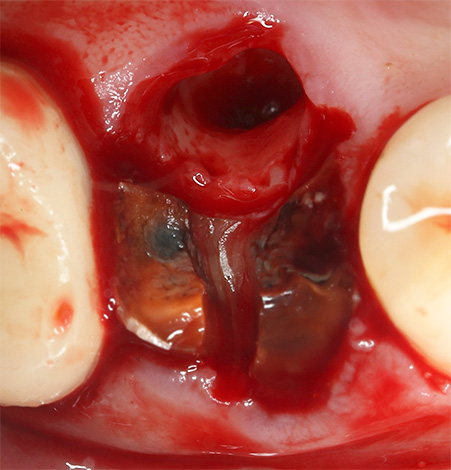
It is interesting
As a result of the growth of granulations around the root circumference left by the dentist, a fibrous capsule is gradually formed - a granuloma, which initially has no cavity. Gradually, the granuloma grows and takes a rounded even shape. Growth is due to resorption (dissolution) of bone tissue.
An increase in bacterial activity creates the prerequisites for the formation of a cavity inside the granuloma. Thus, the granuloma stage passes into the cavity formation - cystogranuloma, and then into the cyst. The cyst cavity is usually filled with decay products of protein and fatty tissues.
If in the future, for any reason (SARS, sinusitis, periodontitis, mechanical trauma to the tooth, etc.), the integrity of the cyst on the root left in the gum will be impaired, this can lead to serious consequences - an increase in temperature to high values (38-39 ° C) ), swelling of the gums and cheeks, pain, general deterioration of well-being. Negative dynamics can persist for several days, but do not wait so long: at the first signs of an unfavorable dynamic situation with a continuous deterioration in general condition, you should immediately consult a doctor.
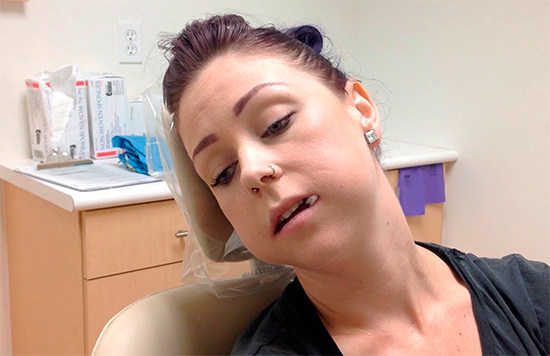
History from the practice of the dentist:
“About a year ago there was a patient with a fang root left about 12-15 years ago. Over the years, a cyst with a diameter of about a centimeter has formed. That man with a fang, everything happened trite: she reached the lateral incisor, and there was a sharp pain in the tooth with symptoms of purulent periodontitis. I can’t understand: the tooth is healthy, and you won’t touch it. They took a picture - everything became clear. The lateral incisor was removed, the man was sent to the operating table “in pursuit” of the complex left root, since about 0.5 cm of bone and gums are above it. ”
Alveolitis
Alveolitis, or, otherwise, inflammation of the walls of the hole after tooth extraction, can occur for various reasons. We list some of them:
- Traumatic surgery.
- Pushing deep into the well of the instrument with pieces of infected carious tissue in a removed tooth or dental deposits.
- Violation of the integrity of the bones of the alveoli, leaving sharp, wounding gum edges.
- Prolonged bleeding from the hole.
- The breakdown of a blood clot or its absence in the hole.
- Violation of the postoperative wound care regimen by the patient himself.
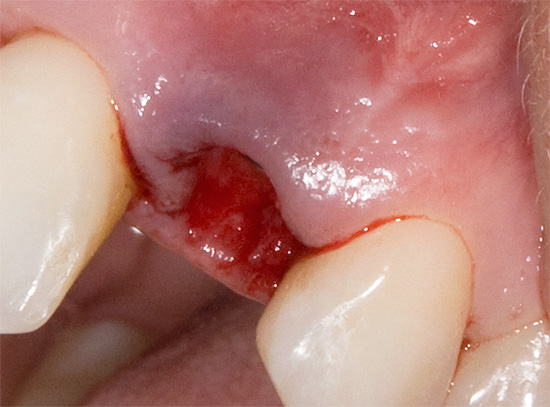
Usually, under the influence of one or more provocative factors, alveolitis develops 1-3 days after tooth extraction with a clinic with worsening general condition, malaise, fever, sharp pains in the gums, impaired chewing on the side of removal and the appearance of bad breath.
If you ignore the further development of these alarming symptoms, alveolitis can pass into the purulent-necrotic stage with the formation of limited osteomyelitis of the tooth socket. If the temperature a few days after tooth extraction has risen to 39 degrees and above, working capacity has dropped to zero, sleep is disturbed, a fetid odor emanates from the mouth, an unbearable acute throbbing pain is tormented, and when removing the lower molars (including wisdom) - the mouth also opens poorly, then with a high degree of probability the alveolitis has already switched to osteomyelitis, and emergency dentist help is needed.
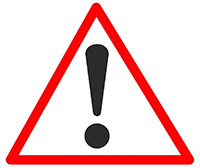
With further prolongation of the process, limited osteomyelitis of the well can go into an abscess or phlegmon with a transition to extremely serious conditions, even fatal.
Should temperature be reduced after tooth extraction and how to do it right
Practitioners agree that it’s still worth to bring down a high temperature after a tooth is pulled out, since its rise causes a gradual violation of the function of vital organs. However, what temperature should be considered one that should be urgently lowered?
The so-called subfebrile temperature (37.2 - 38.0) should not be knocked down, since it helps the body fight bacterial infection - this is a natural process that should not be interfered with. If the thermometer shows above 38.0 ° C, then this already indicates the need for appropriate measures, and regardless of the causes causing the temperature rise.
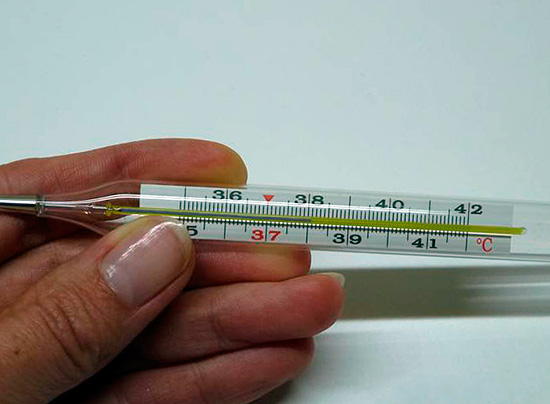
If the day before you pulled out a tooth, and the temperature rose to high values, then you should take antipyretic drugs. The safest of them are drugs based on paracetamol and ibuprofen.
From the point of view of preventing the risks of possible complications, the most recommended form (especially in children) is rectal antipyretic suppositories. Moreover, too high a temperature, which rose a couple of hours after tooth extraction or a few days later, is often accompanied by nausea (sometimes even vomiting), so taking syrups and tablets can be difficult.
Important!
Each antipyretic drug has many side effects, as well as certain contraindications, ignoring which can cause serious complications. That is why it is recommended that you consult a doctor before using any medication.
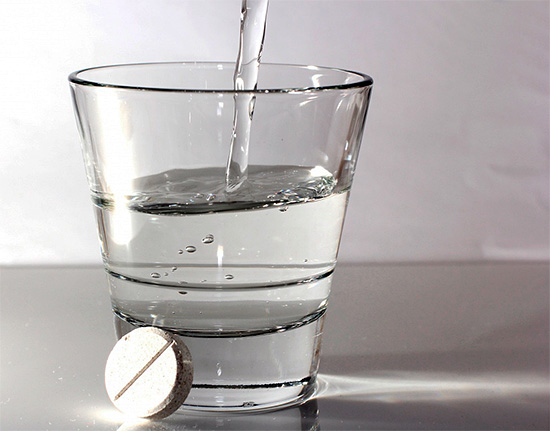
However, even despite a decrease in temperature after taking an antipyretic drug, in the presence of symptoms of inflammation (pain, swelling, bad breath, mastication, etc.), it is recommended to consult a dentist, as otherwise you might miss the development of a serious complication.
Dentist care at elevated temperature
Regardless of which tooth was removed the day before (a wisdom tooth, incisor, fang), a prolonged increase in temperature with alarming dynamics of accompanying symptoms (for example, swelling of the gums and cheeks increases, pain intensifies) is a signal for an immediate visit to the doctor. When contacting the dentist, it is important to tell him in detail all the suspicious symptoms that are worrying you now and the day before.
Any assistance begins with a survey and examination. After conducting an external examination, including in the oral cavity, the dentist is highly likely to prescribe an x-ray of the hole to make sure that parts of the extracted tooth are not left in it.
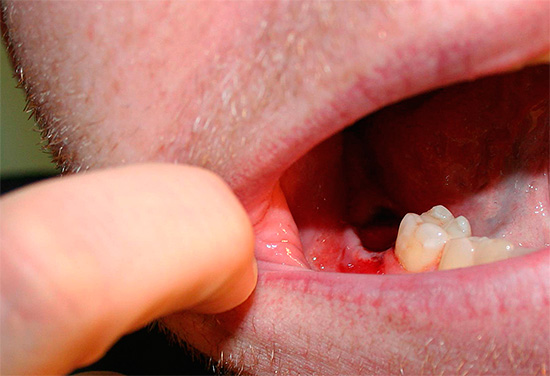
If data on the presence of a root in the well is nevertheless obtained, the doctor will make anesthesia and remove the root or its parts in an accessible way in this clinical situation. After this, the hole is washed with antiseptic solutions, a protective blood clot is formed, and antibiotics and (or) antibacterial drugs are prescribed along with recommendations for wound care.
If there is a suspicion of a granuloma or cyst left in the hole, due to which the temperature rises after tooth extraction, the doctor conducts the measures as a whole according to the same algorithm as in the previous case.
If this reveals the result of gross intervention by the previous dentist (torn gum, cheek, sharp edges of the alveoli and jaw bones), the dentist-surgeon can excise heavily damaged tissues that interfere with healing, sometimes smooths the sharp edges of the bone or bites the protruding areas with special bone nippers. After this, sutures are almost always applied, and the patient clamps a sterile gauze swab for 15-20 minutes to prevent prolonged bleeding.
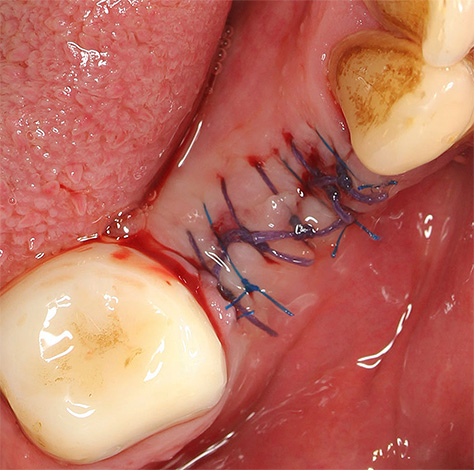
After such additional surgical intervention, the temperature may again rise to high values, however, this will be a very insignificant payment for getting rid of much more serious consequences that could threaten without medical assistance.
Be healthy!
(If you have experienced a temperature increase after tooth extraction - be sure to leave your review at the bottom of this page).
Useful video about inflammation of the bone hole after tooth extraction (which often leads to pain and fever)
What should be done immediately after tooth extraction to prevent inflammation and other problems

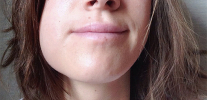
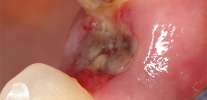
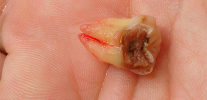
Yeah…
3 days ago, the cheek was swollen, when examining the oral cavity no wounds and whole teeth. But when biting, terrible pain was noted, namely the 6th tooth from below. I went to the dentist, made an aim x-ray, a huge cyst of 4.5 cm was found, and the edge was lying on the nerve. They said they urgently needed to be removed, but the dentist was afraid to remove it due to the location of the nerve. Sent to ChLH, the specialist looked and decided to make an incision in the gums for drainage. Then she went home. After the anesthesia was gone, it became insanely sick, to tears, anesthetized. All swelling, even stronger. The temperature held 37.5. The next day, I turned to a familiar surgeon, he did a CT scan at the same time, and then led to a tooth extraction. He removed the tooth, but the cyst did not come out, as it was large and grew to the nerve. He tried not to damage the nerve and so scraped a cyst, the sounds were scary. Prescribed antibiotics. By evening, at home, the temperature rose to 37.7. She was afraid that she had touched a nerve and now the sensitivity of some part would disappear. But already in the morning all fears were not confirmed. However, the temperature keeps the same, but does not rise above 37.5. The jaw opens with difficulty. Tomorrow I’m going for a second inspection. Swelling did not sleep, it is below the jaw and it hurts. But the tooth itself does not hurt.
So how did it all go?
They removed the tooth, for a long time the blood leaked a little. I went to the doctor again, she said everything is fine, it should be so. The next day, the temperature rose 37, the blood stopped. So I think why the temperature: either from the tooth, or the flu picked up some.
Today they pulled out a wisdom tooth, put 3 stitches ... He came home, and about an hour later the temperature rose. Prescribed antibiotics, being treated)
The wisdom tooth began to grow incorrectly on the lower jaw, at first it ached a little. They made a curettage (they cleaned it from pus around ZM). In the morning, the cheek was swollen. An incision was made with drainage. The cheek continued to swell. Sent to ChLH. Odontogenic osteomyelitis. Removed the wisdom tooth. They injected antibiotics. After 1.5 weeks, the cheek returned to normal, but the discomfort at the removal site remained. Now, having read about this disease on the Internet, I am terribly afraid of becoming chronic. It took 2 weeks after removal. I constantly measure the temperature. This morning, as I saw on a thermometer 37, I almost lost consciousness from fear, I thought it was starting again ... I measured it 5 times, the indicators are lower. Thank God!
Two days ago, the lower wisdom tooth was removed in a free clinic. It was necessary for the child to remove the milk tooth, I think, well, I’ll remove my own at the same time (it hurt). If I knew where this would lead. I became convinced that the free clinic can no longer be contacted. Better to pay and not have problems and consequences. Not only that, after the examination, the doctor designated a completely different tooth on the card for removal, so they also broke off the wall of the adjacent tooth with the tooth being removed. Keeps temperature, discomfort. Previously, a couple of years ago, in the paid clinic, the same tooth was removed, only on the left side, without problems. Now I made an appointment with a paid clinic, so that the “jambs” of our free medicine would be corrected, but for my (not small) money. I’m sorry that I didn’t immediately turn to a paid clinic (they are still at least responsible for their work).
Who is lucky, after a paid clinic is not a fact that everything will be fine. It all depends on the complexity of the structure and on the characteristics of your body.
I completely agree with you.
You know, I recently did in a paid clinic, unfastened 7000, and the temperature is held at 37.2 or 37.5, it does not drop. Alveolitis began, I ride in a day, put iodine swabs. The pain has gone as early as three days, but the temperature has not. And now I don’t know where to go, also a wise lower one.
I turned to paid. There, the jaw was first shredded and sewn together with fragments of the tooth. When after 3 days I came there with hellish pain, I washed and cured the wound with medicine from above, and said that everything was fine .... The next day, the pain was not drowned out by 5 tablets of pain medication, I urgently turned to another clinic. They opened it cleaned. But the hellish pain returned - in addition, my head hurt already ... I ran to the city clinic. There the surgeon, who used to seem dumb to me, carefully removed the last inflamed fragment, and the sick leave was given. Now the pain is going away, and I am returning to life ... So here you will not guess.
Something you often mention the phrase “paid” - you probably don’t want to lose customers)) Normal people (professionals) work in free clinics. The salary, of course, is lower than that of the hapuns-payers, they only treat people not because of the dough, but because it is their calling!
I completely agree that a paid clinic is always more reliable. She concludes an agreement, which spells out the rights and obligations of both parties. And the attitude there, as to a client-patient. 3 years ago in a free clinic he treated a tooth. No attentive attitude and 2 days killed the nerve, and did not kill. Every move hurt me. As a result, I went to the paid one and there they carefully, attentively, almost cursingly cured my tooth. I was satisfied. There are a lot of good doctors in free ones, but you need luck to get them! )) With love from Tatarstan 😉
So free doctors work in paid clinics and vice versa, they have it in the order of things.
The lower tooth was removed 8, after anesthesia the pain began to tears! By evening, the temperature rose to 37.4 ... Then I don’t know what awaits me ((
Probably the same as everyone ...
The tooth was removed about 2 hours ago, the blood is still flowing and the temperature has risen, what should I do?
Hello! Temperature is not uncommon on the first day after removal. It is a natural consequence of a wound (injury). If its values are not critical, then nothing should be done. If the general condition is unsatisfactory, then after consulting a doctor, you can take an antipyretic. In more serious cases, you can call an ambulance. As for bleeding: normalize the pressure, squeeze a sterile gauze swab between the hole and the teeth of the opposite side for 20 minutes. If bleeding from the hole continues, moisten the middle of the swab with a small amount of 3% hydrogen peroxide and also squeeze, but for 5-7 minutes. The main thing is the pressure force. If bleeding continues, consult your doctor who will install a hemostatic sponge in the hole or direct it to intramuscular injection of a hemostatic drug. Try to avoid self-medication - a dentist with related specialists will definitely solve your problem professionally. Health to you!
She removed the lower tooth of wisdom, with 3 injections, they scolded me for an hour. Also sewn up in the end! The next day, a little swollen, I went to the reception, they said that everything heals normally. But on day 3, the temperature rose 37.2, and now the third day has not subsided. Today I'm going to them (
Has it passed now? One to one situation (
A week ago they removed the wisdom tooth, put 4 implants and built bone tissue! The temperature has been around 37 for a week now. The doctor said the body reacted like that.
And the other day I cleaned the dental canal (at the seven). The temperature rose to 37.5 only the next day. While I have no idea, whether from cleaning, or got down with the autumn virus. By evening, the temperature rose to 38, brought down by Coldrex. I lie under a blanket with chills ((
After brushing three pockets, swollen gums and a temperature of 38 - is this normal? They also prescribed to drink metronidazole.
Hello! Raising the temperature to high values after this manipulation is not the norm, but can be caused by various reasons: individual immune response, traumatic procedure, insufficient antibacterial and anti-inflammatory therapy (in recommendations), etc. I am sure that it is urgent to contact your doctor for advice and treatment corrections. Thanks for the question!
5 days ago removed a tooth (six). The roots pounded and slightly cut the gum. I have been making baths since the second day as sage or chamomile. The clot is in place. There is no severe pain, only sometimes dull pain, as if pulsating. Edema remained small. The only thing - in the ear area is not something that burns, but warmth. The temperature rose to 37. Is this normal?
On Monday, only the clinic will open ((What should I do?
Hello! I think that the critical condition at the moment is not determined from your words, but it’s reasonable to visit the dentist to clarify your clinical situation and correct recommendations. It is the dentist who determines the criticality of the condition at an internal appointment. You should be patient and wait until Monday. If the symptoms intensify, then it makes sense to contact the dentist on call immediately. Thanks for the question.
A week ago, a wisdom tooth was removed from below. There was another cyst. Removed, cleaned.On the same evening, it began to freeze and shake very much, the temperature was 38.5. Knocked down by medicine. The next morning there was no temperature, but the jaw was very sore. I went for an examination, they said that we also needed to remove the wisdom tooth from above, because it was “dead” (a little staggered and was blue). As a result, it was deleted. There was no temperature, but! A week has passed, and my mouth hurts to tears, I can’t open my jaw, three things are painless and it doesn’t help ((I went for cleaning every day, the holes are clean, and my jaw hurts to horror! Why I don’t understand. Tomorrow I'll go to the reception again. Tired of living a week in hellish pain! Maybe someone had it, tell me what to do?
Hello! I think that the tactics of your attending physician is not suitable in a specific situation. It might be worth changing the doctor. Many doctors use a method of treating a well with anti-inflammatory ointment to treat alveolitis. In principle, if desired, you can choose the right home treatment after a professional (there are ointments and gels that create a good antibacterial and wound healing effect). And without this, the pain, if it goes away, is not soon, because it is the infection that almost always provokes the problems that you have. I think that you just need to find a doctor with a new course of therapy. Thanks for the question.
As they say - avaricious pays twice. Today a figure eight was removed in a free clinic, a huge hole was not sewn up, they released it home without even checking if it was bleeding or not. Antibiotics and baths were also not prescribed. I lie with a temperature of 39, swollen. In the morning I’ll go to ChLH.
Hello, yesterday my wife got 46 teeth. An hour later, the temperature rose 38.5 and lasts a day, in the morning it fell to 37.9 by lunchtime, rose to 38.2. A severe headache also appeared. A tooth was removed for a fee. The doctor wrote that the removal is complicated. Is it worth it to visit this specialist today? Thanks.
Hello! The fact is that the reaction of the body to a wound (injury) in the oral cavity is not always predictable. Most often, a vigorous response of the body is characteristic when removing complex teeth in pediatric dentistry, however, adults can also have such a reaction with symptoms of local inflammation. It’s definitely not worth the panic here. Despite the fact that you did not write down your doctor’s prescription, I can say that after complicated removal, antibiotics, antihistamines, antibacterials, wound healing, painkillers are almost always prescribed. A correctly selected complex begins to work quickly enough, but sometimes noticeable relief comes only for 2-3 days. Be that as it may, contact your doctor for treatment correction will not be amiss. This will reduce the likelihood of complications and, possibly, will make life after tooth extraction more comfortable. Thanks for the question.
Ten days ago, removed the bottom eight. There was no temperature, no tumors. But just three days ago, the gums suddenly began to ache, and the temperature rose. Until 37.2. There is no aching pain now. But there is a temperature. Gums, like, not swollen, react to sweets. Do I need to go to the doctor to bother him?
Hello! I’m almost sure that it’s worth visiting a dentist. Firstly, pain and temperature say a lot: there are risks of developing alveolitis, even if not with a bright palette of symptoms that usually accompany it. As for the reaction to sweets, this is how a carious tooth can react. And this situation involves visiting a dentist to find a bad tooth, maybe next to a removed wisdom tooth. Thanks for the question.
They removed the wisdom tooth, 12/15/16. About 10 days after that, the temperature was up to 38.5. The doctor prescribed antibiotics, drank them for 5 days (according to the instructions), the temperature dropped to 36.3.Somewhere from 01/10/17 to today (01/19/17) I have a temperature of 37-37.4. My doctor is silent, doesn’t respond to calls and messages to the WhatsApp ...
Hello! I am sure that the temperature at the moment (37-37.4) is already an indicator of the local inflammatory process. I do not think that this can be attributed to alveolitis, but it would not hurt to check the hole to finally make sure that the healing phase correlates with the existing symptoms. The body protects itself as much as possible, therefore such a reaction. If you doubt the attending physician, you can take a picture of the hole after removal to determine its "purity". Anyway, without inspecting the hole in the chair and (possibly) analyzing the picture, you can not do here. The doctor is hiding suspiciously from you, and this gives reason to check comprehensively.
Hello. Very informative site. I learned more than from my doctor. Thank you for your work. The tooth was removed (7 from the bottom left) on Wednesday, immediately in the evening the temperature rose a little (not scary, I drank nurofen). On Friday, an unpleasant odor appeared and greatly increased on this side of the submandibular lymph node. No temperature. I rinse myself with peroxide and chlorhexidine several times a day. Do I need to worry and see a doctor?
Hello! Thank you for your trust. Do not rinse with peroxide and chlorhexidine (so you do more harm without getting a significant therapeutic effect). In addition, a blood clot can be washed out of the hole, after which it often heals with great difficulty. If there is no positive dynamics in the near future (a day or two), then you should consult a dentist.
Good afternoon! I removed the 8 lower tooth last week on Friday, antibiotics were prescribed. From Friday evening and still (the 5th day) the temperature does not drop at all - from 37.0 to 37.5 jumps during the day. The wound itself no longer hurts, drags on ... How long can the temperature last?
Hello! This temperature is a sign of a local inflammatory process. If she rides on the principle: 37.0 in the morning, and 37.5 in the evening, then this condition is within normal limits. It is good that there are no other unpleasant symptoms, which means that the dynamics are generally positive at this point in time. The fact that antibiotics and the rest of the home treatment do their good deed speaks of the prospect of improvement.
Healing takes place individually for everyone, and there is no single time frame for maintaining elevated temperature. Usually it lasts no more than 5-7 days. If the temperature remains on the 7th day after tooth extraction, it is quite possible to contact a dentist-surgeon to examine the hole: if there is no pathology, then you will not lose anything, and if there is something suspicious, then the doctor will stop the problem in time, adjusting the treatment or treating the wound under local anesthesia.
Removed the tooth. After moving away from the freeze, hellish pains began. The next day I let it go, but the temperature rose 37-38, on the night of 39. I had to call an ambulance - the paramedic said nothing. A day later, held on to 37.5, in the evening I started to rise, then fell, but I took 1 tablet of amoxicillin. Now, I don’t know whether to go to dentistry or not?
Hello! An increase in temperature in the first days after removal is a normal reaction of the body. Often the temperature rises in the evening, and in the morning - between 37.0-37.5, which corresponds to an inflammatory reaction against a background of trauma. A dentist should be consulted in case of serious conditions against a background of fever: severe pain, swelling, impaired opening of the mouth, putrefactive bad breath, etc. If the temperature above 37.5 lasts more than 2 days - also to the doctor. Thanks for the question.
On the 14th, the top eight was deleted. For a long time the blood did not stop for 2.5 hours. Then, like, nothing, everything calmed down. The next day, the cheek was slightly swollen, and there was a swollen couple of days. I examined the hole, everything seemed to be normal, the clot was in place. And on the 19th the neighboring upper teeth ached. And not just any particular one, but all together, and the temperature is 37-37.2. Today is the 20th, and aching pain persists, but it is absolutely bearable. The temperature is the same - 37-37.2. No swelling. And the hole itself does not hurt. And today she began to look, and did not see a clot. What is deep down, I do not see. After removal, I asked the doctor what to look for, what to be afraid of, and the doctor answered me: “Forget about the tooth!” I didn’t rinse anything, I didn’t eat anything on this side, but on the 4th day I was already drinking hot tea. Should I see a doctor, or wait and see while?
Hello! I think that the period of the possible development of alveolitis has already passed. There may well be a successful healing of the hole without a blood clot, when it partially washed out of it. I think that now you should be guided by logic and common sense, but it’s better to see the doctor once for your peace of mind (than then think anxiously for a week whether everything heals there normally ...)
Hello. We removed the top seven, the temperature rose. Maybe, of course, a virus. But I, apparently, got a maxillary sinus. The smell is terrible in the nose, washing, unclogging. Now there are a little bloody clots. The tooth was with a cyst. Maybe she’s coming out? Help.
Hello! I think that we are talking about infection of the maxillary sinus due to the close location of the apex of the root of the removed seventh tooth to its wall. To find this out, a consultation with an ENT doctor with close interaction with the maxillofacial surgeon is required. First, let the ENT doctor give a conclusion: if he excludes the pathology in its part, then you can look for the cause of the problem already with the dentist.
On Monday I came to the doctor with a flux. The penultimate tooth was removed, near the wisdom tooth. All is well, but the constant temperature bothers me. She is not higher than 37.5. Today is Wednesday. How long will the temperature last?
There was still a cyst. Prescribed antibiotics.
Hello! If there are no other symptoms, then do not worry. Usually this temperature is present no more than 3-5 days, depending on the reactivity of the immune system. Just the same doctor prescribed an antibiotic to reinforce the elimination of the cause of the problem (bad tooth) with a sufficient antibacterial effect. So be patient and be healthy!
Hello! My son had their tooth removed today (74). Diagnosis: exacerbation of chronic periodontitis. Removal was simple. The gums were bleeding, I did not see pus there. High temperature appeared 2 days before removal. The doctor prescribed an antibiotic that is drunk for 3 days. How long will his temperature last?
Hello! It depends on what temperature we are talking about: high (above 38.5) can be during the first two days after removal, and the upward trend usually occurs towards the end of the evening, and in the morning - between 37.0-37.5. The temperature at the level up to 37.5 may be after removal in the norm no more than 3-4 days. If the temperature takes place to be more than 4 days and there is a tendency to increase closer to the first half of the day, then it is urgent to see a dentist. The same applies to high temperatures, as well as other alarming symptoms that may threaten the health of the child (swelling, severe pain, dirty gray plaque in the hole, putrid breath, etc.).
Hello, yesterday I removed the top 7, anesthesia did not work, there was a cyst. I came home with a temperature of almost 40.Today, the temperature still rises to 38. The hole does not hurt, there is no swelling. Antibiotics were not prescribed. I don’t know what to do, wait until it passes? Or is it to the doctor?
Hello! It is best to consult a doctor, as with these symptoms, you may need to take antibiotics and the use of anti-inflammatory drugs. If the temperature is high in the morning, then this is especially bad. An increase in temperature may be associated with an active infectious process, which is urgently worth stopping. Tooth extraction does not always immediately eradicate a bacterial infection. Once again, I advise you to visit a doctor!
Hello! Yesterday they removed the remnants of the lower 8, with 3 injections - and then it is painful. Swollen cheek. In the morning everything became more or less, all day I feel as if I want to get sick, but the temperature is lowered, 36.1-36.3. By evening, my mother was not distressed ((I drank it, it saved a little. After removing it, they put some medicine in the hole, they said that it would come out, do not touch it. Maybe it was from him? And what should I do?
Hello! From the "drug", which put in the hole, it could hardly be. Usually in the first days after tooth extraction just in the late afternoon, the condition may worsen, especially since it is the removal of a lower wisdom tooth. I don’t think it’s worth touching the drug, but it’s worth consulting with your doctor in order to examine the hole and (maybe) adjust the treatment. I’m almost sure that there’s nothing wrong, but at least the doctor will also be calm that your healing is going on normally. Follow the recommendations that the dentist has prescribed for you, and also get advice from him (just in case).
Yesterday, the lower 5 tooth was removed, in the evening the pressure jumped to 150, the gum got sick. Today the cheek is swollen, the temperature has risen to 38. I went to the clinic. The surgeon (doctor of the highest category) Ismagilov said: go to the therapist, the case is not ours, after tooth extraction there can be no such temperature. I asked at least something after tooth extraction, and he: I said, not our case. I went to the pharmacy, asked how to soothe the gums, advised nalgesin. I drank a pill at home - after 5 hours the temperature is 37. The question is - why are these aesculapius? I read the article - everything became clear, why the temperature and swelling. Doctors should probably read the Internet too. Thank you for the article!
Hello! It’s good that you all ended happily. Thank you too. High temperature due to trauma after tooth extraction, of course, may well appear. And increased pressure, and against the background of even moral experiences alone, often arises. Good luck to you!
Hello! A flux formed in the afternoon, the next day at 11 o’clock I went to the dentist, he removed the tooth (or rather, what was left of him - 3 roots), said that the pus had gone, so he would not make a gum section. The whole day and all night after that the blood did not stop, the temperature rose to 38. I drink the antibiotic amoxicillin. Is it possible that the pus does not come out, and the incision still had to be made?
Hello! As for the need for cuts - this is a purely individual issue. In general, according to the protocol, incisions with periostitis (“flux”) are mandatory, especially on the lower jaw. When removing the upper teeth with "flux", many dental surgeons do not accompany the procedure with incisions. Just for most patients, even the mere word “incision” brings a lot of negative impressions. In addition to tooth extraction, anyone who wants to get the impression of working with a scalpel. Therefore, surgeons, seeing that the removal of the upper teeth can not be accompanied by an incision and everything is successful, do not do it.Since you have a three-root tooth, I suspect that just the top 6 or 7 was removed.
The fact that you had prolonged bleeding is not very good, but if everything is tolerable on the second day, then you can not worry. About temperature 38: this is a common reaction against the background of a tooth extraction with a purulent infection. Everything does not pass quickly, as many people think, especially in such cases.
Regarding the last question (that pus does not come out): yes, it is possible, but it is extremely rare. I think that it is worth visiting a dentist in order to determine the quality of healing of the hole. Usually, after such removals, control examinations are scheduled: every other day, at 3, at 7.
They removed the tooth, the hole was bleeding for a long time. The next day, the blood stopped. Nothing, but on the second day my cheek swelled up, I didn’t measure the temperature. On the third day I measured - 37. Teeth ache and pulsate near the pulled out tooth. This is normal? What do you advise?
Hello! I would advise you to consult a dentist to monitor the situation. The fact is that 3-4 days after tooth extraction, the risk of developing alveolitis is high, and you have symptoms that give you the right to think about the beginning of this process. It is clear that edema, temperature and even soreness can be a normal condition, but taking into account the symptoms, it does not hurt to protect yourself from possible complications. After the check, you can no longer worry and continue to comply with the recommendations of your doctor.
Good afternoon. Yesterday they removed the lower “6”, because in the root canal of the tooth (after treatment 4 years ago), it appears that the tip of the “needle” is stuck and the canal is not completely sealed. An inflammation formed under the root, which began to go to the neighboring root of this tooth. The doctor said that it is possible to perform an operation to remove a portion of the root, but there is no guarantee to cure inflammation due to the fact that it has started to go to the neighboring root, so removal is the best option. As a result, they removed it, everything is fine, they sewed up the hole, but yesterday and today in the morning the temperature is 37.5, and tonight 38.5. Periodic dull pain in the gums and a sore spot and discomfort when you click on the adjacent "5". Is this the norm? Should I panic at this temperature?
Hello! Do not panic: the first two days (especially), a tendency to an increase in temperature is often observed, as a result of inflammation against the background of an injury - usually a slight increase in the morning, and towards the evening up to 39. Only high temperature should be brought down. Sometimes the temperature also occurs on the third day after removal, especially if the body is weakened.
Despite the fact that the symptoms described by you fit into a normal reaction in half of the patients after tooth extraction, it is highly recommended to consult your doctor for a scheduled examination of the hole 3-4 days after the procedure, since it is during this period that the purulent inflammatory process can join the purulent , and the result will be alveolitis - inflammation of the hole with characteristic signs.
After tooth extraction, in almost all patients, adjacent to the socket teeth respond when pressed for several days to one degree or another. So in this regard, do not worry.
Hello) I removed the top seven yesterday, the temperature jumps from 37.0 to 38.5 and my jaw hurts when biting. Do I need to go for a second examination? They said nothing to rinse.
Hello! In the first days after tooth extraction, there is usually a tendency to increase temperature in the late afternoon. If the temperature is low (usually an ambulance is caused at values from 39.0 for an adult), then do not worry. However, it is advisable to undergo a checkup at the doctor 3-4 days after removal to eliminate the risk of additional problems due to alveolitis.When biting on adjacent teeth, pain is possible up to 3-5 days after removal, sometimes up to 7 days. This is the norm, since there is a wound next to innocent teeth, and there is a certain connection with it of the periapical tissues of the roots of adjacent teeth.
As for rinsing - indeed, it is usually not recommended to rinse anything, this opinion is shared by many dentists.
Thanks! Thanks to your comments, I calmed down after learning that fever and bleeding gums after tooth extraction is normal and not a reason to get upset right away! And then I already began to bury myself, I thought that the surgeon had brought some infection to me.
Hello! I did not find such questions above, therefore ... I removed the upper wisdom tooth in one place, but since the prices there are unrealistic, I decided to remove the lower wisdom tooth in another. After removal of the lower wisdom tooth, the second day fever, nausea, pain in the lower jaw and weakness. In the first clinic, the anesthetic was different from the anesthetic in the second. In the first case, I did not feel it at all, in the second, numbness of the entire half of my face and throat. I think it was somehow outdated. My question is, can these side effects be associated with such an anesthetic, or is it due to the fact that the lower jaw is always more difficult to respond to? What do you think about it? Why use obsolete anesthetics? And question number 2: the wounds were not sutured, in which cases, however, the edges of the wound are sutured, and in which not?
Hello! Side effects from anesthetics rarely relate to numbness of the face, most often anesthesia can affect overall well-being within 1-2 days (nausea, headache, drowsiness, bleeding from the socket, etc.), up to allergic reactions. It is much more likely that the effect of "anesthesia" of the half of the face and throat is associated with the traumatic nature of the work on the lower jaw, where the mandibular canal closely passes with a nerve that can be compressed by a hematoma. Much less often during removal, a mechanical nerve injury occurs with medical instruments.
The lower jaw is almost always more problematic in many ways than the upper jaw - you correctly noticed that.
Obsolete anesthetics are used for various reasons, most often: 1. State dentistry and is not able to supply doctors with other drugs; 2. Or the dentist himself, for a number of reasons, does not have the skills to work with imported drugs.
As for wound closure: after a difficult tooth extraction, the wound is really recommended to be closed for comfortable and quick healing. Although doctors here may have different opinions.
I recommend contacting a good dentist to monitor the hole.
Good afternoon! A week ago, the bottom 8 was removed. Her cheek was swollen, there was no pain. As prescribed by the doctor, I drank nimesil 2 times a day. On the third day, the swelling subsided, but in the cheek along the bone there was hard swelling (4 cm in size), as if a stone had been sewn into the cheek. Teeth began to whine (tolerantly), temperature 37.2. Today is a week. Was at the doctor a couple of days ago, the doctor examined the hole and said that everything was fine (no inflammation), just a solid hematoma. BUT why then temperature and pain? Thanks for the answer.
Hello! Apparently, the tooth extraction turned out to be somewhat traumatic, and therefore the process of tissue restoration around the hole takes such a long time. I do not think that we are talking about alveolitis.
And about the "solid hematoma" - a moot point. It is possible that there are protruding edges of the alveoli under the gum, creating the effect of "a stone sewn into the cheek." A temperature of 37.2 is associated with a local inflammatory process. In principle, this can be considered a state within normal limits even within 7 days after the removal of the wisdom tooth. About the fact that “they began to whine their teeth” - I believe that we are talking about the radiation of pain from the same wound.She, of course, hurts in the first days, and then - only reacts after her irritation (food, hard objects, drinks, etc.). Such pain can last up to 2 weeks, depending on the degree of "openness" of the hole, the presence or absence of a blood clot, as well as the possible attachment of infection. But I’m almost sure that you do not have alveolitis, you should not worry; if the condition worsens, consult a doctor.
Good afternoon. 6 days ago, the lower wisdom tooth was removed. There was a small swelling of the cheeks. The pain is average, drank nimesil. There was no temperature. For the sixth day, the swelling is gone, every day I drink 100 mg of nimesil. The pain is tolerable, but there was discomfort. Yesterday there was a temperature of 37.1. In the morning it was normal, and now again 37.1. The gums are not swollen. The hole is also normal ... Sound the alarm?
Hello! I think it’s not worth the alarm. The fact is that there is a clear tendency to improve, the disappearance of symptoms (reduction of edema, pain, etc.). A temperature of 37.1 indicates the presence of a local inflammatory process against the background of healing of the hole, and closer to evening, the temperature can just slightly increase. Usually, this symptom disappears completely during the initial healing of the hole (within 1-2 weeks).
If your health does not deteriorate, then do not worry - be patient and follow the recommendations of your doctor.
Three days ago, he pulled out a wisdom tooth that rested on another tooth. Therefore, the gum was first incised and then torn. And now the third day the temperature is 38.7 (maximum): in the morning it drops to 37.5, and in the evening it rises again. And so, one might say, all day - it rises, then falls. The first two days there were wild pains in the gums and swelling of the gums, as well as inflamed lymph nodes and there was wild weakness and fatigue. On the third day, the swelling subsided, the pain went away and there is no fatigue, but sometimes the lymph nodes bother ... The doctor says the wound heals well. I drink antibiotics and anti-inflammatory. I wait, when I can sleep normally, and not sweat and eat))
A tooth ached on Friday night. Tolerated until Monday, as he could anesthetized. By Monday, the tumor had grown to the larynx. The temperature rose 38.5. I went to the dentist, I wanted to make a puncture so that the pus would come out. It did not work, because I could not remove the crown. He removed the tooth, the tumor began to subside in the evening, and now has reached the chest. The temperature holds 37.2. Tell me how scary it is?
Hello! In such severe cases, you should not rely on chance, but constant monitoring by the attending physician is required to prevent life-threatening complications (you describe rather alarming symptoms). I recommend that you regularly visit a doctor to monitor the situation - sometimes the case in such clinical cases comes to treatment in a hospital setting. Health to you!
Good afternoon! Removed the bottom 8-ku (09/07/2017). The tooth was horizontal, and deep. She put little ice, and slept a couple of times at night on her sore cheek. The cheek began to swell. On the 3rd day, the temperature rose 38.7. Shot down. During the whole 3 days there was a temperature of 38.4, etc. Shot down. Today (on day 4), the cheek is still large, and has become hard, as if stone. Edema goes on the neck, everything is red and terribly painful to touch - acute pain. There was no temperature. By evening, again at 38.0.
Did after removal: Augmentin antibiotic - 5 d (the day before the operation I started drinking). The doctor extended up to 7 days, but did not call for an appointment. Rinsing with chlorhexidine - on the 2nd day of surgery. She lubricated the metrogil dent along the suture line - on the 3rd day (although the doctor said on the 2nd day), but I couldn’t put my finger in it. To eliminate the consequences of the antibiotic, I drink lacto.
Is the body behavior normal? The hole does not hurt, the swollen cheek hurts, it hurts to speak and eat.I can hardly eat on the right side, it’s a little painful to swallow. Swelling becomes burgundy. It does not grow, but I will not say that it is falling.
Hello, Sasha! The symptoms described by you are quite alarming and can talk about the development of diffuse purulent inflammation (phlegmon):
1. High temperature;
2. Swelling of the cheeks ("hard as a stone");
3. Swelling is released to the neck, there is a pronounced hyperemia of the skin (you indicate a burgundy color);
4. Pain when swallowing and talking;
5. Limited mouth opening.
All these signs indicate the presence of a very serious disease (phlegmon of the submandibular, pterygo-maxillary, periopharyngeal space). In such a situation, I would recommend to immediately call an ambulance and go to hospitalization in the Department of Oral and Maxillofacial Surgery.
They removed the lower “lying” figure-eight, but since the apex was badly destroyed (the tooth did not hurt), we managed to do without sawing the jaw, although we were busy for a long time. 4 sutures were applied, washed with chlorhexidine, iodine-based medicine was applied. After the anesthesia subsided, she began to shiver, drank ibuprofen, as recommended by the doctor. So far, we decided to do without antibiotics, to watch, because I have a baby.
On the second day in the morning, as soon as the antipyretic effect was over, the temperature jumped high again, up to 39.5 at one moment, and in a few hours it fell to 37. The cheek was swollen, the suture did not hurt. The mouth opened with an effort. On the third day, the temperature was 37.1-37.4, on the fourth the whole day was 37.1, and the surgeon examined the seam. I found that the suture is consistent, there is no inflammation, I recommended developing the cheek muscle so that there are no contractures.
On the fifth day, the temperature is somehow 37.5. Nothing hurts, the seam looks the same, the swelling decreases, the mouth opens better. But the temperature, although small, will not settle down at all.
I rinse my mouth after eating with an antiseptic (a few drops of alcohol calendula or propolis in a glass of warm water), but only from the remnants of food, very carefully so as not to blur anything in the hole there. Dissolve lozenges with sage.
While I wait, I’m watching.
Is it worth it to rinse the wound with Miramistin after removing the lower 8 for 3 days?
Hello Denis. Miramistin is a good antiseptic, which is sometimes prescribed after tooth extraction. However, you should not rinse, but do oral baths so as not to destroy the blood clot in the hole.
Hello! On Friday, the bottom eight was removed. The doctor prescribed antihistamines, antibiotic and ibuprofen for 7 days. The first 3 days there was no temperature, on the fourth day the temperature rose: 37.1-37.3, and does not fall, the gum aches.
Today is the seventh day after removal. The doctor said that food is clogged (although there is no pus) and that it is necessary to rinse. What should I do with temperature? Isn't it normal that doesn't subside?
Hello! This temperature is a consequence of a local inflammatory process against a background of injury. This is a common occurrence after a tooth extraction operation, but there are exceptions (for example, when a high temperature lasts several days in a row). As for aching pain, this is also a normal condition if there are no other alarming symptoms (severe swelling, high fever, pain that cannot be stopped by analgesics, putrid breath, etc.).
As for the food being clogged in the hole - when the hole does not have a blood clot, it really becomes a kind of “trash basket” for food debris from the oral cavity. She will heal with difficulty. Sometimes it is advisable to form a new blood clot with anesthesia, but you can simply adjust the recommendations by prescribing rinses with decoctions of herbs or other non-irritating drugs. These issues should be discussed with your doctor.
Hello! 9 days ago the lower one was removed. Three days the jaw and head ached. Saw painkillers for the night ... Then, it seems, it became tolerant. On the 6th day the teeth began to hurt nearby, there was a fever and a temperature of 37.2, pus departs. I was at the reception on day 7 - they said that everything was fine, there was no redness. I drink an antibiotic and rinse with salt + iodine said to drip. But the temperature does not pass. Do I need to clean the hole?
Hello! In the situation described by you, it is worth taking a picture of the problem area: there is a suspicion of the presence of roots or parts of the crown of the tooth left in the hole. It would also be nice to check the condition of the roots and canals of a tooth adjacent to the socket, since it may contain a hidden inflammatory process against the background of carious destruction. In any case, suppuration for 6-7 days after tooth extraction is not normal.
The fact that you follow the doctor’s recommendations is wonderful. After a detailed diagnosis and determination of the true cause of the increase in temperature and suppuration, it will be possible to say whether or not to make the curettage of the hole. Most often, cleaning is required precisely in such cases as you describe. Therefore, be sure to consult your dentist to clarify the situation.
Hello. They removed the lower eight in the hospital of the PMF, the tooth was in the bone, and under the 7th tooth, they sawed it out. I am in the hospital for 6 days, they inject antibiotics 3 times a day. The temperature from lunch every day is 37.0, rises in the evening to 37.4. I open my mouth barely, the lower part of the jaw numb, tongue numb. When talking, there is a feeling that the jaw goes sideways. Now it feels like the nose is swelling. The doctor says that these are the consequences of the operation and everything will pass. But for 6 days in the hospital, and there are no changes, and there is pain in the temple. Maybe someone faced such a problem?
Hello! Given the complexity of the operation and its invasiveness (judging by the description), the symptoms present in you are quite natural. Stabilization often occurs only a couple of weeks after the intervention.
Numbness with high probability can be associated with a hematoma in the region of the mandibular nerve, which is compressed by it. This disappears as the hematoma resolves, most often in the first month after tooth extraction. Your temperature is within the normal range for such a post-traumatic situation. Almost everyone has edema after complex removal. Violation of the opening of the mouth - also often occurs after the removal of eighth teeth. Ideally, your doctor should choose a set of exercises to improve your mouth opening.
As for pain in the temple - the nature of pain after complex removal of wisdom teeth is largely individual. Someone's face, head, tonsils, ear, and throat may hurt. So you need to be patient, stick to the doctor’s recommendations, and the unpleasant consequences will gradually disappear.
The remnants of the wisdom tooth rushed, the temperature was also 37.6. I think this is a protective reaction of the body, it must pass!
In March 2016, he treated caries (in normal paid dentistry) and the dentist suggested taking a panoramic picture and looking at the condition of the wisdom teeth. It turned out that the lower left eight grows in the seventh tooth - respectively, the eight to remove (completely agree). BUT I was very scared by the complexity of the removal: "We need a whole mini-operation and an experienced surgeon, in our clinic this is not, if you want, then I have a good professor at the department, he will do it." I said good. And I forgot with joy about this tooth for almost 2 years.
On December 28, 2017 this tooth reminded of itself, I did not attach importance to pain and thought that everything would go away by itself, but it didn’t. January 1 wrote to the “long-standing” dentist with a request to coordinate the operation with the professor and the cost.It turned out that the professor will be able only after the holidays, since the institute does not work and it will come out in a tidy amount. There was no time to wait, for a day I google a ton of information, according to reviews I found a cool maxillofacial surgeon. January 3, 2018 I'm already at his appointment - it turns out that I have periodontitis or periostitis. In general, one of these. He prescribed me to drink the antibiotic Ciprolet A, 7 days, 3 tablets per day. Then either remove it or first remove the “hood” and take a new panoramic picture before the visit.
I take a picture on January 9, the picture is the same as two years earlier. On January 10, a friend calls and offers his cool specialist and the price is much less, I was interested in it. I’m at the reception on January 11, I sent the picture yesterday. They removed the tooth without cutting it with a drill, by loosening (I thought my jaw would break, sometimes holding it with my hand). They sewed everything up as expected, they did not give me recommendations for leaving, although I asked.
36 hours have passed since the removal, the following symptoms: 1) severe difficulty opening the mouth, 2) severe pain when swallowing on the side of the jaw where the tooth was removed, 3) temperature 37.5, 4) swollen cheek. In the morning I will call the dentist who removed the tooth.
Question. Do I need to take antibiotics and worry about these symptoms?
Hello! Symptoms are justified in terms of the complexity of the manipulation and its invasiveness. However, a possible negative trend in this case is better to confirm or deny by the attending physician or other dentist. I mean the fact that the symptoms that you described can indicate an impending complication, and simply can only characterize a large trauma in the oral cavity, in which there is just a difficulty in opening the mouth, and fever, and swelling. Regarding antibiotics: with large surgical interventions they are indicated, but the doctor himself determines the treatment tactics in each case. If there really was periostitis, antibiotics are 100% needed. But again, it’s better not to prescribe any drugs yourself, consult a specialist.
Hello. Four days ago, removed the top 6, the hole was bleeding for about 1 day. Then every day it got better and better (the pain went away). But this morning I discovered that the hole again began to bleed very strongly, the temperature rose (37.1), the hole began to ache, and my head hurt on the side of the torn tooth. I can go to the dentist only on Monday. Should I urgently contact the dentist on call?
Hello! By all indications, you have developed alveolitis (inflammation of the hole). This process, as a rule, is accompanied by severe pain, an unpleasant odor from the tooth hole and sometimes an increase in body temperature. Alveolitis can provoke, including late bleeding from the hole. Therefore, do not waste time and consult a doctor urgently. The sooner the doctor begins treatment of alveolitis, the less pain you will have to suffer and the course of treatment will be shorter.
Hello. I have had “bad” teeth since childhood. This is inherited in our family, and I have four children. I always treated my teeth. Many people remember that earlier in the school they called me to the dentist according to the magazine, I never refused. After the last pregnancy, the teeth began to break, some abscesses on the gums, on the lower incisors of the granuloma. In general, a disaster. I’m starting the preparation and prosthetics for the third time, I hope I will get to the end. For the whole life has already removed 13 teeth. Ten days ago, the complex lower seven was removed (1 hour 20 minutes). With crushing, x-ray and suturing. And three days ago - the top seven with three long roots. Now I don’t understand what worries more. On the lower jaw it pulls and hurts.After removing the upper one, I couldn’t squeeze the bandage strongly, the bottom hurts, an hour and a half later it started to shiver, and then the hour pounded so hard that I could not control it. The body shudders, the jaw shakes, the jaw pounded loudly, she was afraid to bite her tongue. The temperature rose to 39, after two hours the temperature dropped.
Today I woke up with a slightly swollen cheek, the temperature remains at 37. The husband says that the smell is unpleasant. A neighboring tooth definitely has suppuration on the gum. Torment questions. What was that? So the local anesthesia departed, or did you already have to sound the alarm? Maybe this ulcer hit and went infection? How often can teeth be removed and how many at once? I still have a lot to remove, but once a week anesthesia, and then antibiotics and pain medication ... I want beautiful, albeit false jaws, but I'm afraid to not withstand complications. And I am only 34 years old, and soon to leave work leave to care for a child.
Hello Yulia! After complex tooth extraction, edema always occurs and painful sensations appear. You write that you were chilled and “pounded” - a local anesthetic is not the cause of such symptoms. So the body tries to raise the body temperature in order to more effectively fight the infection (the stress you have suffered should also be taken into account).
In general, swelling of the cheeks, fever (even 37), soreness, bad breath indicate an inflammatory process. I recommend contacting a dentist-surgeon for an examination and in order to clarify further treatment.
I note that in situations such as yours, sometimes it is recommended to carry out radical treatment to solve a tooth problem - removing the remaining teeth under sedation with simultaneous implantation and prosthetics on them for a short period of time (literally 3 days). In a number of clinical cases (not all), this is the only right decision, saving the patient from numerous visits to the dentist, helping to restore aesthetics, proper bite and chewing function.
Hello! Yesterday removed the lower wisdom tooth. After 3 hours, the temperature rose 38.2. I knocked her down. And now this morning rose to 38, also shot down. Nothing hurts, not swollen. Should I panic and go to the dentist? How much temperature can it hold?
Hello Anna. The temperature really often rises after tooth extraction and is one of the signs of inflammation (it can last from a couple of days to a week or more). Inflammation does not always go away quickly on its own, and in your case, an elevated temperature in the morning (usually it rises in the evening) is also alarming. You should not panic, but I recommend that you make an appointment with your doctor for an appointment.
On June 14, a wisdom tooth on the lower jaw was removed. Removal was accompanied by a gingival incision and suturing. June 16 was at the dentist’s appointment, said that everything was fine. But I have swelling, the temperature is held at 37.3. With pain, I can open my mouth to bite a banana, swallowing food is accompanied by pain, as with angina, and there is aching pain (either in the place of the former tooth, or adjacent to it, I can not say for sure). Tell me, are these phenomena normal for 2 days after surgery, or do I need to sound the alarm? Thanks in advance for your reply!
Hello Daria. If the tooth extraction operation was complex and lasted a long time, then it is often accompanied by significant trauma (often during such operations the mucous membrane is cut and the bone is cut out). In this case, the soft tissue next to the tooth reacts sharply to such an intervention that it can provoke severe swelling, fever, painful swallowing, and also difficulty opening the mouth.These phenomena are normal on the 2nd day after tooth extraction, but here it is important to monitor the dynamics - it should get better every day. If there is no positive dynamics, you should go to the doctor for an examination without delay.
Hello. My wisdom tooth (figure eight) was having difficulty coming out, it hurt. I went to the dentist - they made a gum section. The pain did not go away. I went again, and again an incision was made on the same wound ... The temperature of 37.3 has been kept for 5 days already, weakness, gum ache. Is this the way it should be? The temperature does not drop. I am very worried.
Hello. This is possible, in these cases, painkillers from the NSAID group are usually taken (required after meals). If the pain and temperature do not go away within the next 2-3 days, and the dynamics are not positive, then it is necessary to re-visit the doctor without further delay and evaluate the condition of the tooth. In general, I can say that in such situations there is a risk of serious complications, as a result of which many doctors prefer to remove such problematic wisdom teeth as soon as possible. So carefully monitor your well-being, and if the condition worsens, hurry to the doctor.
Hello. My tooth hurt a lot. In the morning I got up, looked at my face - a lump appeared. Then the dentist removed the tooth. It has been 3 days since then. I have a temperature of 37.4. What should I do?
Hello, Aigul. 3 days is a sufficient period for the condition to normalize. Since this did not happen, I do not recommend waiting any longer, it is better to consult a doctor now - sometimes in such cases antibiotic therapy is started, which includes antibiotic, probiotic, antihistamine, NSAIDs. The doctor can only evaluate the feasibility of such treatment upon examination, so hurry to the doctor.
Hello. It has been 4 days since they removed the lower wisdom tooth. They made incisions and sewn up. The gum still hurts so much, it gives to neighboring teeth - I drink Nise! Temperature that is (37.3), then no. Can you tell me how many days it can hurt? You should probably go to the doctor - at least antibiotics will be prescribed or something else. Thanks.
Hello, Tatyana. Normally, pain can persist for 3-5 days, then it becomes much better. If the pain does not decrease, then you must definitely consult a doctor to assess the condition of the hole and exclude possible risks of alveolitis and other complications. In your situation, everything goes to the fact that you still have to go to the doctor.
They pulled out the right eight on Sunday, December 11th. Until Thursday, my teeth, cheek, jaw and throat hurt on the right. There was still a temperature of 37-37.5. Thursday went again, they froze me again, cleaned, washed and put a yellow ointment. They said that he would be calming, they prescribed an antibiotic. But the pain as it was, did not go away. As I could neither eat nor sleep without painkillers, it hurts now, I still suffer. And at night the pain intensifies, as if they poured acid, everything burns. At the reception only on Monday, the 17th. He was in a free clinic in Tobolsk.
This is how it happens.
Good afternoon! 5 days ago, the lower six were removed against the background of exacerbation of chronic periodontitis (subperiosteal abscess). I drank an antibiotic for 5 days (Tsifran ST). The hole heals normally, no pain. But the temperature still does not return to normal, all these 5 days in the morning it is normal 36.6, and after lunch it rises to 37.0. I did not rise above. Is this a norm?
Hello! In the absence of other unpleasant symptoms, a temperature of 37.0 in the afternoon can be considered a normal option for several days after tooth extraction.The processes that intensified against the background of purulent inflammation in the lower "six" + after its removal have not yet come to naught. The temperature in most cases in the morning is low, and during the day rises to 36.9, which is the norm. 37.0 is a kind of threshold value between norm and pathology. It is important to know what the trend will be next. Gradually (within another 2-3 days) the temperature should return to normal, but if this does not happen, this is an occasion to consult a doctor, just in case.
Hello. The tooth was removed yesterday, the temperature is 38.6. Who to contact? I don’t want to go to my doctor anymore.
Hello! If you do not want to contact your doctor, then you can always immediately contact any dental surgeon in almost any clinic. High temperature on the second day after tooth extraction may indicate an inflammatory process.
Hello. Three weeks ago, her upper wisdom tooth was pulled out of her husband. After 2 weeks, he became very sick, pulsation. Temperature 37.4. He cannot sleep. It hurts when lying. We went and did a tomography, said that there was no inflammation and no fragments. There is no gum edema, but in the picture the condition seemed to have been torn out yesterday, and not 3 weeks ago. What to do? Where to go
Hello Olga. I would recommend contacting the Department of Dental Surgery - for revision of the socket and treatment of alveolitis. Often in such situations, long-term treatment is carried out with the patient being treated on iodoform turunda. This means that a turunda (a bandage soaked in iodine) is placed in the hole of the extracted tooth, followed by a decrease in its volume - until the hole is filled up with granulation tissue from the bottom up.
This morning I got 8 removed on the right side of the lower jaw. The tooth lay almost horizontally. Accordingly, the gum was cut, and then it was hollowed out of the bone for a long time to hook and remove. The whole operation took about 40 minutes.
Appointment: do not drink, do not eat for 2 hours, and then eat and drink only slightly warm. Drink pain medication, on the 2nd day, start making soda baths. Come on a visit the next day.
After 4 hours, the effect of anesthesia was over and hellish pain began, radiating to the ear and lymph node under the jaw. Pentalgin drank, the pain went away for 3.5 hours. Chills appeared and, as a result, the temperature was 37.8. And also, a bump on the lower jaw (it seems to me a hematoma, because it has a bluish tint and it hurts to touch it).
I drank another Pentalgin tablet, and at my own peril and risk (the doctor did not prescribe, and given the temperature and severe pain, it is scary to miss the time) I went to the pharmacy for the antibiotic Linkomycin. Bifiform, Ibuprofen took him, just in case the temperature rises, and Nise.
The question is: how much painkiller can I drink per day? I drank 1 Pentalgin tablet at 4:30 a.m., anesthesia was done at 8 am, then drank 1 Pentalgin tablet at 12:00 and 15:30. The pain is very strong and the temperature does not decrease from the level of 37.8. Can I drink another Nise? Or ibuprofen?
Good afternoon, Galina! In the instructions for the use of drugs there is a maximum dose depending on age and weight. If the pain and temperature do not decrease, contact your doctor. I do not recommend self-medication, so as not to harm your health and not aggravate the situation.
Hello! Really looking forward to the answer! 7 bottom, 2 roots were removed from below, there was a difficult removal. The doctor pulled a tooth for about 45 minutes, not at once, but in parts. Then on the 7th day I went to the dentist (for a long time I suffered pain giving in my ear). I decided on the 7th day to measure the temperature - 37.
It turned out to be a "dry hole."For 4 days I went for an examination - they picked it in a new way so that a blood clot formed. Then they put an antibiotic (ointment) and drank an antibiotic for 3 days. Now the dentist says she likes the hole. Now it’s already 11 days, and the temperature is 37. I even cry, very scared, why? How long can this last after a dry hole? Everyone writes about 5-7 days, and I already have 11.
Hello Maria! Sometimes, after tooth extraction, a complication associated with inflammation of the dimple occurs - alveolitis. Given that the doctor regularly observes you and prescribed adequate therapy, you should not worry, especially because of the timelines. Even with good treatment, individual symptoms can persist for up to a month.
Hello! The wisdom tooth on the lower jaw was removed, the removal was very difficult (the tooth is retinned, distoped). Healing was normal, nothing bothered. A month later, she began to ache under the jaw and pus began to go from the overgrown gums. The doctor cleaned something and laid the medicine. In the evening there was a slight temperature of 37 and a little swollen cheek. In the morning, the gums are a little swollen, the temperature is 37.2 and where the medicine on the side pus comes out a little. Very worried. Is this condition dangerous and should I urgently need to see a doctor?
Hello, Natalia. Yes, in such a situation, a second visit to the doctor is necessary. It is necessary to make an audit of the hole - most likely, it will require treatment with antiseptic drugs. In addition, in such cases, antibiotics and other drugs are often prescribed that should help reduce inflammation.